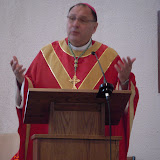 |
| Bishop Grecco's Visit |
Click to view all the pictures.
This blog contains Fr. Jose' message from the Parish Bulletin for St. Edith Stein Roman Catholic Church in Toronto.
Lord Jesus, |
My Dear Brothers and Sisters,
The feast of Peter and Paul that marks the end of the Jubilee Year of St. Paul, brings us face to face with the twin pillars of the original church. They are popularly known as the “Apostle to the Jews” and the “Apostle to the Gentiles”. Both Peter and Paul suffered martyrdom in Rome in the mid sixties. Scholars agree that it is highly unlikely that they both died on the same day. June 29th was probably chosen by the church as the day of their death because of the earlier association of June 29th with Romulus, the founder of the city of Rome. By replacing the day honouring Romulus with the Christian feast day of Peter and Paul, the church attempted to “baptize”, as it were, yet another pagan celebration. The Christian observance of the feast of Peter and Paul began in Rome in A.D. 258. Even though it is difficult to attribute the foundation of the church in Rome to Peter or to Paul, it is because they are acknowledged leaders of the Jewish and Gentile missions that they have been recognized as being indirectly responsible for the foundation of the Roman Church.
Last Sunday we heard about how Jesus calmed the storm at sea. This 13th Sunday in ordinary time we hear about Jesus healing a woman and raising a little girl from the dead (Mk. 5.21-43) Each of these miracle stories are tied together by the theme of faith in the person Jesus. In the second reading from the second letter of Paul to the Corinthians, we hear about “the gracious act of our Lord Jesus Christ”. Paul tells the Corinthians that Jesus, though rich, became poor for our sake so that we could all share in Jesus’ abundant wealth. Paul speaks of Jesus here as a role model. Like Jesus, we too are called to share the abundance of our resources with each other. In the simple act of offering resources from our surplus to others in need, we help create a community of equality where everyone’s burden is lighter.
Both Peter and Paul were made heroes and models for us by grace. Let us draw inspiration from them and submit ourselves to God’s grace.
My Dear Brothers and Sisters,
Natural disasters like tsunami of 2004 that struck 12 countries in Asia and Africa, floodwaters of 2005 that ravaged India and Pakistan and the hurricanes like Katrina that hit North America made the whole world look on in shock and horror. In the face of these powerful watery cataclysms of nature, doesn't it seem that the God who created the universe in all its balance and beauty has turned a blind eye and a deaf ear to the perils of humankind? Today’s readings challenge our thinking.
We are told by the author of Job in today’s first reading (Job 38:1, 8-11) that God can shut the doors of the sea, set its limits, fasten the bar of its door and command that proud waves be stilled. We are also assured by the evangelist Mark in today’s Gospel (Mk 4:35-41) that Jesus has the power to command both wind and sea, and these elemental giants of nature shall obey him. The author of the responsorial psalm adds words of comfort to the voices of Job and the evangelist Mark. In Psalm 107, the ancient composer tells us that the same God who can command the storm to blow can also shush it into a gentle breeze and bring travellers to their desired haven upon calmed and placid seas.
If all these words are true about the power of God being infinitely greater than the surges and swells of the turbulent seas and oceans and flooding rains and rivers of this earth, then what shall our posture be before such greatness? To find the answer to this question, Mark draws our attention to the boat wherein Jesus and his disciples were sailing the sea of Galilee. Tossed about in the squall, with waves breaking over its sides, the listing boat was beginning to take on water. Yet while the disciples panicked, Jesus lay in the stern, sound asleep. In Jesus, we discover the attitude that we are to emulate in order to weather the storms of life, both natural and spiritual. That attitude, one of complete trust and faith, would see Jesus through all that lay ahead of him; that same trusting faith is ours to cultivate by daily giving ourselves over to God’s care, God’s will, God’s designs for our lives.
Faithfulness must characterize all our dealing with God – not part-time faithfulness, but daily deliberate trust. Only such a daily effort will prepare us for when disasters come our way. Even when panic chokes our hope and fear threatens our faith, we must always remember that a greater power than panic or fear is sleeping soundly in our sinking boat.
Lord Jesus, strengthen us through the Eucharist to give our own life’s blood in loving service to others. |
Lord Jesus, may your loving action lead us to the transformative power of the Holy Trinity. |
